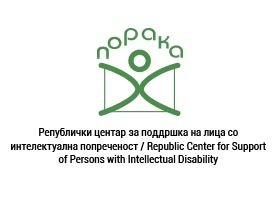Two initiatives submitted for assessing the constitutionality of parts from the Law for Social Protection
On 21.02.2013, the members of the network for protection against discrimination submitted two initiatives to the Constitutional Court of Republic of Macedonia in relation to starting a procedure for assessing the constitutionality and legality of certain articles in the Law for Social Protection, referring to realization of the rights of persons with intellectual disability.
The initiatives were prepared by the Republic Center – PORAKA, and all seven organizations – members of the network for protection against discrimination joined as applicants to the initiatives.
The foundation of the two initiatives is contained in the Constitution of the Republic of Macedonia, which provides guarantee of the rights to helping the (weak, powerless) and unable to work citizens, and for the persons with disability provision of special protection and conditions for their inclusion in society life. The constitution of the Republic of Macedonia guarantees the social protection, social security and social insurance, as rights that apply to everyone, everywhere and always. The guarantees of the Constitution are that these rights are comprehensive, available and effective for the citizens under equal circumstances and without any discriminatory grounds.
The first submitted initiative refers to assessing the constitutionality of Article 84-a from the Law for Social Protection, which determines the mobility allowance to be available for persons above 26 years of age with 100% physical disability and a persons with moderate, severe and profound impairment in the mental development who cannot fulfill his/her basic life needs without a wheelchair.
The aim of the initiative is to enable use of the mobility allowance for persons with 100% physical disability and for persons with moderate, severe and profound impairment in the mental development who cannot fulfill his/her basic life needs regardless their age and without being conditioned to use a wheelchair, as a condition and assistive device to meet the basic living needs.
The disputed parts of the article 84-a from the Law are unconstitutional and they put persons with disability, more specifically persons with intellectual disability in an unequal position. In this way, the legislator through the Law for Social Protection narrows and establishes limits and conditionings of the rights stipulated in the Constitution, i.e. the realization of the mobility allowance is limited with age, and at the same time conditioned by using a wheelchair.
The second submitted initiative by the members of the network refers to three disputed articles in the Law for Social Protection (article 72, paragraph 2, article 73, article 74 paragraphs 1 and 2) relating to the realization of the right to financial allowance for assistance and care from another person and which determine this financial allowance to be used by persons with severe and profound intellectual disability in larger scale and persons with moderate intellectual disability in smaller scale.
The aim of the initiative is to enable use of the right to this financial allowance in larger scale for persons with moderate intellectual disability as well, which would lead to equal treatment towards all persons with intellectual disability regardless the scale of the need for assistance and care from another person.
The disputed articles of the Law are unconstitutional and they put persons with intellectual disability in unequal position. Thus, the Law narrows, establishes limits and divides the stipulated rights in the Constitution according to the level of disability, i.e. conditions the realization of the right to assistance and care from another person. In financial sense, it results in lower amount for the financial allowance for assistance and care from another person for persons with moderate intellectual disability.
The network for protection against discrimination was established in December 2010, and is constituted by the following organizations: Foundation Open Society – Macedonia; Health Education and Research Association (HERA); HOPS – Healthy Options Project Skopje; Helsinki Committee for Human Rights of the Republic of Macedonia and Association for Emancipation, Solidarity and Equality of Women – Macedonia (ESE); Roma SOS; Coalition “Sexual and health rights of marginalized communities” and the Republic center for Support of Persons with Intellectual Disability – PORAKA. This network has the purpose to develop strategic advocacy in cases of discrimination by submitting cases to the Commission for protection against discrimination and to the domestic and international courts. The development of domestic practice is triggered by providing free legal aid in strategic cases of discrimination.



